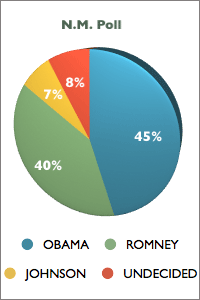As we know, of the 33 in-cycle seats, Democrats are defending 23. Today, they appear safe in 10 of those: California (Feinstein), Delaware (Carper), Maryland (Cardin), Minnesota (Klobuchar), New Jersey (Menendez), New York (Gillibrand), Pennsylvania (Casey), Rhode Island (Whitehouse), Washington (Cantwell), and West Virginia (Manchin).
Two more are headed toward the Independent column, and those winners will either caucus or vote with the Democrats. Sen. Bernie Sanders (Vermont) runs as an Independent but joins the Democratic conference. Angus King, the Independent former governor, is strong favorite for Maine Sen. Olympia Snowe’s (R) seat as the campaign turns into the home stretch. He is projected to caucus with the Democrats, but has yet to commit to do so. If the fate of the majority comes down to King, it is unclear what might happen.
Trending toward the Democrats appears to be the races in Hawaii (open seat – Rep. Mazie Hirono), Michigan (Stabenow), New Mexico (open seat – Rep. Martin Heinrich), and Ohio (Sherrod Brown).
Hawaii polls have been erratic, but the preponderance of polling data gives Rep. Mazie Hirono a clear lead. Same is true in Michigan for two-term Sen. Debbie Stabenow and first-term incumbent Sherrod Brown. Though polling shows Rep. Martin Heinrich well ahead of former Rep. Heather Wilson (R-NM-1), this is another race that could turn. Wilson’s strength with Independents in the state could make a difference if Democratic turnout is even slightly low.
Republicans are safe in fives seats: Mississippi (Wicker), Tennessee (Corker), Texas (Cruz), Utah (Hatch), and Wyoming (Barrasso).
Trending toward the GOP are the races in Indiana (open seat – Richard Mourdock), Massachusetts (Scott Brown), Nebraska (open seat – state Sen. Deb Fischer), Nevada (Heller), North Dakota (open seat – Rep. Rick Berg), and Wisconsin (open seat – former governor Tommy Thompson).
The Indiana race is tight – some polls show it about even – but Richard Mourdock has not made any mistakes in his battle with Rep. Joe Donnelly (D-IN-2). Hoosier State voting trends at the top of the ticket – Mitt Romney appears headed for victory over the President here and Rep. Mike Pence is a solid favorite in the governor’s race – should help pull Mourdock across the finish line.
Recent polling in Massachusetts and Nevada is giving senators Scott Brown and Dean Heller small, but consistent and discernible leads over Elizabeth Warren (D) and Rep. Shelley Berkley (D-NV-1), respectively.
While the North Dakota seat has been tight for most of the campaign, more recent polling indicates that Rep. Rick Berg is opening up a lead well beyond the margin of error.
All post-primary polls in Wisconsin give former governor Tommy Thompson a lead over Madison Rep. Tammy Baldwin (D-WI-2). All of these races could turn away from the Republicans before Election Day, but today, the GOP candidates look to be in the winning position.
Questions abound in the following campaigns:
• Arizona (open seat): Though Rep. Jeff Flake (R-AZ-6) is favored here, some polls are detecting a close race and Democratic nominee Richard Carmona is making this campaign a battle.
• Connecticut (open seat): A combination of factors have come together to make this race, at least in the short term, more competitive than expected. GOP nominee Linda McMahon being awarded the Independent Party ballot line, new polling showing the two candidates running close, and a personal financial situation involving Rep. Chris Murphy (D-CT-5) are all minor individual items that taken in the aggregate could become significant.
• Florida: Polling has been extremely inconsistent in the Sunshine State, but more surveys favor Sen. Ben Nelson than Rep. Connie Mack IV (R-FL-14). The campaign is trending Nelson’s way now, but the presidential final wave will have a lot to say about its final outcome.
• Missouri: Right after the August primary, Rep. Todd Akin made rape-related abortion comments that stirred a national hornet’s nest. Incumbent Sen. Claire McCaskill (D) jumped well into the lead, but the margin has since dissipated and the race is back in toss-up range. McCaskill is the most vulnerable of all Democratic incumbents standing for re-election, and Akin is the Republicans’ weakest national challenger. This one is far from over.
Montana: The political battle between first-term Sen. Jon Tester (D) and Rep. Denny Rehberg (R-MT-AL) has been close for months. In the past eight weeks, the polling was detecting a slight Rehberg advantage. A new survey released last week, however, showed Tester regaining the lead. The presidential election will weigh heavily on this race, and Mitt Romney seems to be enjoying a healthy advantage in Big Sky Country. This race will likely go down to the wire.
• Virginia: Possibly the closest race in the country, the campaign between former senator George Allen (R) and ex-governor Tim Kaine (D) has been dead even for the better part of a year. As in Florida and Montana, the presidential race looms large in the Virginia Senate race. The result is too close to call.
To recap, if this analysis is correct, the Democrats are safe or ahead in 16 races, including the two Independent candidates, and Republicans are safe in 11. Under this model, the GOP would attain the majority 51 number if they win any three of the six questionable races isolated above.








